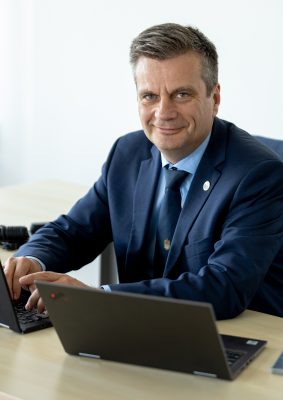 Built on its scientific activities and achievements, as well as on its extensive international and industry collaborations, Semmelweis University is a regional center of excellence in science and innovation in the field of life sciences.
Built on its scientific activities and achievements, as well as on its extensive international and industry collaborations, Semmelweis University is a regional center of excellence in science and innovation in the field of life sciences.
Research, development, and innovation at Semmelweis University are most prominent in the fields of living natural sciences with a particular emphasis on medical sciences. The diversity and broad spectrum of the University’s RDI activities are represented by more than 300 research groups, including national and international research grants, a broad range of research fields and intensive scientific publication activity.
It is of utmost importance for the university to be an active player in the European scientific arena and to increase its contribution to the regional innovation ecosystem by supporting multidisciplinary scientific activities and developing innovative procedures and devices. These endeavors can only be pursued by quick and flexible adaption to the changing social and economic demands and by taking the lead in creating new processes.
Semmelweis University aims to be among the top 100 higher education institutions in the world and to become one of the five best European universities of health sciences. To achieve these goals, it is essential to increase the quality, efficiency, volume and income-generating capacity of scientific activities.
Innovative thinking and interdisciplinary scientific approach are the main drivers behind these goals, which are reinforced by the students’ early involvement in scientific activities through the university’s talent support programs and PhD schools. Researchers of the 21st century do not work isolated but are engaged in activities arching over disciplines and interlocking with industry partners. Therefore, Semmelweis University encourages the involvement of entrepreneurs, investors, inventors and educational institutions to actively participate in joint educational and research projects.
Ensuring the seamless and efficient operation of RDI activities across diverse fields and sectors, it is necessary to have a strong support system. It helps our researchers increase their focus on science and innovation by providing professional support in planning clinical trials, having access to biobanks of tissue samples, getting assistance in the protection of intellectual property, submitting ethics permits and research financing. The Office for Clinical Research Coordinating Center harmonizes background activities related to clinical trials; the Center for Translational Medicine helps increase the quality and quantity of clinical trials by channeling the generated knowledge directly to PhD training and patient care; the Laboratory Animal Science Coordination Center provides researchers with assistance in animal testing in line with modern ethical and professional requirements; the Centre of Science & Innovation Vice-rector and Business Development harmonizes market sales of RDI products and services created at the university.
The RDI support system also provides a strong foundation for Semmelweis University’s plan to set up a Health Industry-Biotechnology Science Park further improving scientific performance across multiple disciplines. Bringing scientific research and health industry under one umbrella will give new momentum to research in bionics, medical technology and pharmaceutical developments, enabling the transformation of scientific knowledge into relevant and beneficial innovation. By sealing partnership with Hungarian and international industry players, Science Park will also enable joint courses with industry partners to provide hands-on education encouraging the students’ commitment to science early on.
The well-established RDI support system and the Health Industry-Biotechnology Science Park promote multidisciplinary RDI activities that have emerging relevance today and will be dominant in the future, thus making Semmelweis University’s innovation ecosystem become a true staple of European excellence in research and innovation.
Dr. Péter Ferdinandy
Vice-Rector for Science and Innovation